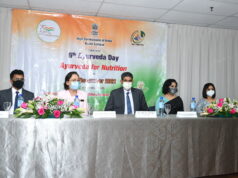Salads figure large in diets, but the image they have of being healthful is slightly misleading, since many are mostly composed of cellulose, which humans are not equipped to digest.
If your aim is to lose weight or keep trim, lettuce is useful to fill the stomach and improve fluid intake, while sticking to calorie limits. But the green leaves are not nutritionally essential.
Some salads can in fact mess up a diet. While it’s true that raw vegetables contain few calories, some methods of salad preparation can blow calorie targets apart.
“A Caesar salad with Parmesan cheese and croutons, all swimming in a cream sauce, has a lot of calories and is by no means a light meal anymore,” says nutrition scientist Alexa Iwan. The type of dressing you choose plays a large part in a salad’s calorie level.
“Ready-made dressings often contain a lot of fat, salt and sugar, and are therefore not the best choice for everyday salads. But in special situations – camping, for instance – they are great to fall back on,” says Iwan.
But otherwise, it’s better to make a vinaigrette out of good oil and vinegar. “If you find that making fresh dressing is too time-consuming, then you can also make a larger portion and store it in the fridge for three to four days,” she suggests. Add fish, meat or a cheese to the salad, and you have yourself a wholesome meal.
Where salads come into their own for non-dieters is in balancing out nutritional intake. Raw vegetables are an important element of any healthy eating. “Assessed for vitamins, fibre and calories in total, vegetables score highly. They contain many micronutrients for few calories,” says Bernhard Watzl, who heads a nutrition institute in Germany.
In general, people don’t eat enough vegetables, he says. “Dietary recommendations call for 400 grams of vegetables daily, plus 250 grams of fruit.” Most people only take in 125 grams of vegetables a day.
The quality of the vegetables matters too: fast-grown iceberg lettuces from hothouses are mostly just cellulose, whereas tomatoes have much more nutritional value. As a rule, people with healthy immune systems don’t need to worry about the bacteria they consume with their salads, and washing vegetables before eating them can significantly reduce the number of germ count.
“When washing your salad, make sure to use clean, potable water and a clean bowl,” says Heidi Wichmann-Schauer, a scientist who studies microbes. “Be sure to clean your sink beforehand if that’s where you usually rinse your salad.”
Rinsing, drying and chopping a salad takes time. Ready-made salads, for example the kinds found in a plastic bag, are faster and easier. However, according to Iwan, “pre-washed and chopped salad from the bag contains fewer nutrients than a freshly prepared one.”
“Because it usually is a few days until the salad finally gets eaten, bacteria have time to to grow in bagged salads, with listeria being potentially a problem,” says Wichmann-Schauer.
“Listeria can be especially dangerous for pregnant women, and older people or those with a weakened immune system, so it’s best for them to avoid eating bagged salad.”
Normally healthy people should not worry: “We should in general eat more fruits and vegetables, including ready-made salads in the bag. Most importantly: Go for variety in colour and taste,” Watzl summarizes.
And if pre-made salads aren’t your thing, Iwan suggests: “A good alternative for when you’re on the go is raw vegetables.”
Cherry tomatoes or olives, for example, are easy to grab and require no chopping or other equipment to eat.
-dpa











